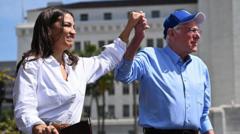The Democratic party is in distress: fractures exist and members diverge on the best way to rally against the Republicans during a turbulent political landscape.
The rural town of Bakersfield, California, recently played host to a notable rally featuring progressive leaders like Congresswoman Alexandria Ocasio-Cortez and Independent Senator Bernie Sanders. Their "Fighting Oligarchy" tour drew crowds in a region predominantly backed by Trump, yet sentiments among attendees conveyed frustration and dissatisfaction with the Democratic Party's current trajectory.
While Sanders and Ocasio-Cortez were met with enthusiastic support, many attendees expressed disillusionment, criticizing their party for insufficiently challenging Trump and his policies—a sentiment felt over the wider Democratic base. Karla Alcantar, a young rally-goer, articulated this frustration, stating, “I feel like some of them have just folded over completely.”
The upcoming political landscape appears challenging for the Democrats as they remain out of power. An alarming poll revealed that over half of Democratic voters feel their leadership is misaligned. Instead of seeking bipartisanship, a majority favor aggressive opposition against Republicans. The crux of this division seems rooted in the question of action - with supporters yearning for concrete, impactful policies to address pressing economic grievances.
Former Congressman Conor Lamb highlighted this need for urgency, pointing out that supporters desire specific advocacy that reflects the current climate—the survival of significant Democratic values appears to hinge on meaningful actions rather than mere rhetoric.
The "Fighting Oligarchy" tour focuses on economic injustices and attempts to resonate with constituents who felt alienated by traditional Democratic strategies. Ocasio-Cortez’s pointed question—"Oligarchy or democracy?"—frames their argument succinctly. However, views on how best to position the party vary significantly, pitting factions against one another amid calls for reform.
Some Democrats, like California Governor Gavin Newsom, argue for a more centrist approach as a long-term strategy for regaining power, including engaging in difficult dialogues with those outside the party. This move has ignited tension, especially with younger leaders advocating for novel voices to prevent stagnation. David Hogg—a young weapons safety advocate—has pledged significant resources to support primary challengers, stating plainly, "We cannot win back the majority if we do not convince the American people that our party offers something... substantially better."
Amid the rising voices demanding change, rally-goer Lisa Richards praised Senator Cory Booker's lengthy protest against Trump, highlighting a collective yearning for Democratic leaders to articulate and embody active resistance.
As the party continues to navigate a path fraught with ideological challenges and shifting generational expectations, the call for decisive action remains resounding among grassroots activists, leaving the question of "What comes next?" looming heavily over party discussions.
The rural town of Bakersfield, California, recently played host to a notable rally featuring progressive leaders like Congresswoman Alexandria Ocasio-Cortez and Independent Senator Bernie Sanders. Their "Fighting Oligarchy" tour drew crowds in a region predominantly backed by Trump, yet sentiments among attendees conveyed frustration and dissatisfaction with the Democratic Party's current trajectory.
While Sanders and Ocasio-Cortez were met with enthusiastic support, many attendees expressed disillusionment, criticizing their party for insufficiently challenging Trump and his policies—a sentiment felt over the wider Democratic base. Karla Alcantar, a young rally-goer, articulated this frustration, stating, “I feel like some of them have just folded over completely.”
The upcoming political landscape appears challenging for the Democrats as they remain out of power. An alarming poll revealed that over half of Democratic voters feel their leadership is misaligned. Instead of seeking bipartisanship, a majority favor aggressive opposition against Republicans. The crux of this division seems rooted in the question of action - with supporters yearning for concrete, impactful policies to address pressing economic grievances.
Former Congressman Conor Lamb highlighted this need for urgency, pointing out that supporters desire specific advocacy that reflects the current climate—the survival of significant Democratic values appears to hinge on meaningful actions rather than mere rhetoric.
The "Fighting Oligarchy" tour focuses on economic injustices and attempts to resonate with constituents who felt alienated by traditional Democratic strategies. Ocasio-Cortez’s pointed question—"Oligarchy or democracy?"—frames their argument succinctly. However, views on how best to position the party vary significantly, pitting factions against one another amid calls for reform.
Some Democrats, like California Governor Gavin Newsom, argue for a more centrist approach as a long-term strategy for regaining power, including engaging in difficult dialogues with those outside the party. This move has ignited tension, especially with younger leaders advocating for novel voices to prevent stagnation. David Hogg—a young weapons safety advocate—has pledged significant resources to support primary challengers, stating plainly, "We cannot win back the majority if we do not convince the American people that our party offers something... substantially better."
Amid the rising voices demanding change, rally-goer Lisa Richards praised Senator Cory Booker's lengthy protest against Trump, highlighting a collective yearning for Democratic leaders to articulate and embody active resistance.
As the party continues to navigate a path fraught with ideological challenges and shifting generational expectations, the call for decisive action remains resounding among grassroots activists, leaving the question of "What comes next?" looming heavily over party discussions.



















